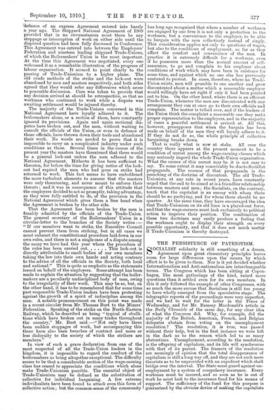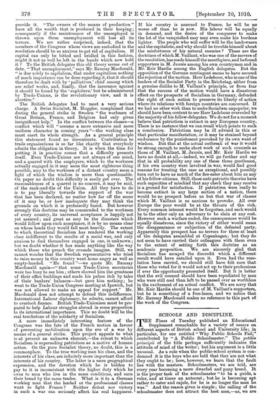THE PERSISTENCE OF PATRIOTISM.
SOCIALIST solidarity is still something of a dream. Agreement upon great elementary principles leaves room for large differences upon the means by which effect is to be given to them. Nor is it yet decided whether Internationalism and Anti-nationalism are interchangeable terms. The Congress which has been sitting at Copen- hagen, like most gatherings of the kind, raised more questions than it settled even for its own members. In this it only followed the example of other Congresses, with so much the more excuse that Socialism is still too young to have wholly emerged from the speculative stage. The telegraphic reports of the proceedings were very imperfect, and we had to wait for the letter in the Times of Wednesday, and for Mr. Ramsay Macdonald's article in the Daily Chronicle of the same day, for any clear idea of what the Congress did. Why, for example, did the majority of the British, American, French, and Belgian delegates abstain from voting on the unemployment resolution ? The resolution, it is true, was passed without their help, but in the first instance we were left in the dark as to the reason which led to so many abstentions. Unemployment, according to the resolution, is the offspring of capitalism, and its life will synchronise with that of its parent. The framers of the resolution are seemingly of opinion that the total disappearance of capitalism is still a long way off, and they are not such mere theorists as to be unprovided with an expedient which shall bridge over the interval. The State must guard against un- employment by a system of compulsory insurance. Every workman must be insured, and so soon as he is out of work he must look to the insurance fund for his means of support. The sufficiency of the fund for this purpose is guaranteed by the obvious device of making the capitalists provide it. " The owners of the means of production " have all the wealth that is produced in their keeping ; consequently if the maintenance of the unemployed is thrown upon them unemployment will lose all its terrors. We are rather surprised, indeed, that the members of the Congress whose views are embodied in the resolution should be so anxious to get rid of capitalism. If capital can only be bitted and bridled in this fashion, might it not as well be left in the hands which now hold it ? To the British delegates this old theory seems out of date. " That unemployment," says Mr. Ramsay Macdonald, " is due solely to capitalism, that under capitalism nothing of much importance can be done regarding it, that it should therefore be dealt with by ' palliatives,' chief among which are relief works, and, finally, that the insurance against it should be found. by the exploiters,' but be administered by Trade-Unions, is the revolutionary view, and it is abortive."
The British delegates had to meet a very serious charge. A Swiss Socialist, M. Iluggler, complained that during the general strike in Sweden " the workmen of Great Britain, France, and Belgium had only given insignificant help." In the conflict between the classes—a conflict which will " assume a more extensive and more uniform character in coming years "—the working class must exert its whole strength. As a general principle this statement found no dissentients. Contribution to trade organisations is so far like charity that everybody admits the obligation in theory. It is when the time for putting it in practice comes that a difficulty presents itself. Even Trade-Unions are not always of one mind, and a quarrel with the employers, which to the workmen actually engaged in it may seem the most righteous thing possible, may to the workmen of a distant country seem a fight of which the wisdom is more than questionable. On paper no doubt this difficulty is easily got over. The reasonableness of a quarrel is no concern, it may be said, of the rank-and-file of the Union. All they have to do is to pay liberally towards the support of the war that has been declared, no matter how far off the scene of it may be, or how inadequate they may think the grounds on which it is professedly based. But however strongly this doctrine may be commended to the workmen of every country, its universal acceptance is happily not yet assured ; and great as may be the disasters which would follow upon such acceptance, it is by no means clear on whose heads they would fall most heavily. The extent to which theoretical Socialism has rendered the working class indifferent to the results of a social war, and only anxious to find themselves engaged in one, is unknown ; but we doubt whether it has made anything like the way which those who preach the crusade imagine. Still, we cannot wonder that the Swedish representative who tried to raise money in this country went home angry as well as empty-handed. " He found "—we quote Mr. Ramsay Macdonald again—" that some Trade-Union secretaries were too busy to see him ; others showed him the greatness of their office buildings and made his palms itch by tales of their bankers' balances—but gave him nothing; he went to the Trade-Union Congress meeting at Ipswich, but was not allowed to make an appeal for support." Mr. Macdonald does not attempt to defend this indifference. International Labour diplomacy, he admits, cannot afford to overlook finance. British Trade-Unionism must be pre- pared to help Labour struggles abroad in some proportion to its international importance. This no doubt will be the real touchstone of the solidarity of Socialism.
A more immediately interesting feature of the Congress was the fate of the French motion in favour of preventing mobilisation upon the eve of a war by means of a general strike. This project appeals to what is at present an unknown element,—the extent to which Socialism is superseding patriotism as a motive of human action. On the pure Socialist theory, no doubt, this is a commonplace. To the true working man his class, and the interests of his class, are infinitely more important than the interests of his country. The latter is a mere geographical expression, and the devotion which he is bidden to pay to it is inconsistent with the higher duty which he owes to men who live in the same conditions, and earn their bread by the same trades. What is it to a German working man that the landed or the professional classes want to fight France ? Neither defeat nor victory in such a war can seriously affect his real happiness. If his country is annexed to France, he will be no worse off than he is now. His labour will be equally in demand, and the desire of the conqueror to make the lot of the vanquished easy may even make his burdens lighter. The people who will suffer will be the landowners and the capitalists, and why should he trouble himself about the misfortunes of his natural enemies ? These are the doctrines of which M. Valliant, who was one of the movers of the resolution, has made himself the mouthpiece, and hefound supporters in M. Jaure,s among his own countrymen and in Mr. Keir Hardie among the English delegates. But the opposition of the German contingent seems to have secured the rejection of the motion. Herr Ledebour, who is one of the leaders of the Socialist Party in the Reichstag, either from a genuine dislike to M Vailla.nt's principle, or from fear that the success of the motion would have a disastrous effect on the prospects of Socialism in Germany, defended the right of each nation to preserve its liberty of action where its relations with foreign countries are concerned. If we had no other wish than to make Socialism unpopular, we should have been content to see Herr Ledebour overruled by the majority of his fellow-delegates. We do not for a moment believe that patriotism is extinct in any European country. There is no instance that we can recall which points to such a conclusion. Patriotism may be ill advised in this or that particular manifestation, or it may be strained beyond endurance by the punishment provoked by its own want of wisdom. But that at the actual outbreak of war it would be strong enough to make short work of such counsels as those of M. Valliant, M. Jaures, and Mr. Keir Hardie we have no doubt at all,—indeed, we will go further and say that in all probability any one of these three gentlemen, if his own country were involved in war, would find good. reasons for treating the case as exceptional, and possibly turn out to have as much of the fire-eater about him as any of his fellow-citizens. Still, these anti-patriotic theories have such capacities of mischief that any check they may receive is a ground for satisfaction. If patriotism were really to become extinct in any large section of a nation, there would be no prospect before us but that war of classes which M. Vaillant is so anxious to provoke. All over Europe the poor would. be at the throats of the rich. Every common interest would be forgotten, and each would. be to the other only an adversary to be slain at any cost. However such a warfare ended, the consequences would be equally disastrous, since the victory of either would mean the disappearance or subjection of the defeated party. Apparently this prospect has no terrors for three at least of the delegates assembled at Copenhagen; but they do not seem to have carried their colleagues with them even to the extent of setting forth this doctrine as an academic proposition. We are sincerely glad that Socialism has escaped the discredit which a different result would have entailed upon it. Even had the reso- lution been carried, we should still have felt sure that those who voted for it would not act up to their professions if ever the opportunity presented itself. But it is better that the evil counsel should have been repudiated by men who were still cool than► left to be passed over as worthless in the excitement of an actual conflict. We are sorry that Mr. Keir Hardie should be one of M. Vaillant's supporters, but he is something of a free-lance, and we notice that Mr Ramsay Macdonald makes no reference to this part of the work of the Congress.







































 Previous page
Previous page